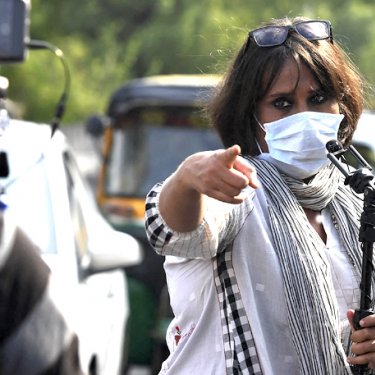Indian journalist wrongly accused of “wantonly” inaccurate reporting

Reporters Without Borders (RSF) condemns the judicial harassment of Barkha Dutt, a reporter in northern India’s Uttar Pradesh state, who is wrongly accused of falsely reporting that two murdered girls had been sexually assaulted. The prosecutors must drop the case against this journalist, RSF said.
Barkha Dutt, who often reports for the Washington Post and runs a YouTube local news channel called MoJo Story, told RSF that she regards the accusation brought against her, in the form of a police “First Information Report” (FIR) on 21 February, as a “harassment attempt” and “pure intimidation.”
The accusation concerns Dutt’s coverage of the death of two teenage girls who are Dalits (members of the Indian group formerly known as “untouchables”). They were found poisoned in a field in Uttar Pradesh’s Unnao district after going missing on 17 February.
The FIR names Dutt’s Twitter account, @themojostory, along with seven other Twitter accounts, including those of several politicians who claimed the girls were sexually assaulted. The MoJo Story report never claimed this, but the FIR says it did. Dutt’s request for a copy of the FIR has been refused by the police, thereby preventing her from legally disputing the accusation.
Lumped together
“The police are deliberately lumping together unverified comments by politicians with the MoJo Story’s rigorous journalistic reporting,” said Daniel Bastard, the head of RSF’s Asia-Pacific desk. “This is clearly a case of judicial harassment aimed at silencing any independent investigative coverage of this case. We urge the Uttar Pradesh prosecutor’s office to immediately dismiss this accusation, which is not based on any credible evidence, and furthermore violates the criminal procedure code by denying Barkha Dutt access to the case.”
According to the police, Dutt is accused under criminal code article 153 of “wantonly giving provocation with intent to cause riot,” which is punishable by up to a year in prison. The police were almost certainly annoyed that her reporting included interviews with members of the family of the two murdered girls, who said the police pressured them to quickly cremate their bodies.
This is a highly sensitive claim coming just five months after the alleged gang-rape and subsequent death of a 19-year-old Dalit woman in Hathras, another Uttar Pradesh district, in September – a case that received a great deal attention throughout India, as RSF reported at the time.
Blocked access
After the young woman died of her injuries in hospital, the police quickly cremated her body the next day, fuelling speculation that they wanted to destroy evidence. The police then blocked access to the district to prevent reporters from interviewing the family.
As she reported in a tweet at the time, Dutt tried to circumvent the police roadblock by walking several kilometres across fields but the police caught her, put her in a police van, and deposited her back on the road, outside the sealed-off area.
India is ranked 142nd out of 180 countries in RSF's 2020 World Press Freedom Index.



